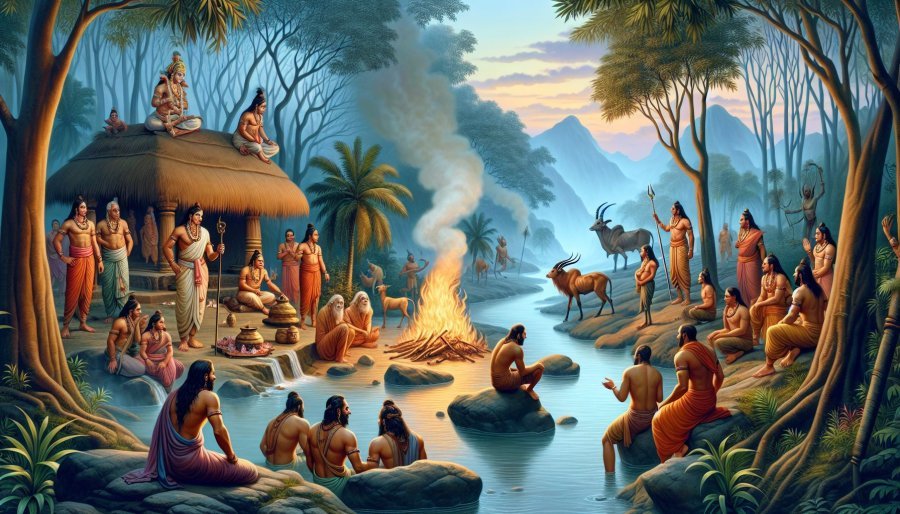Section V - History of Bhrigu's Lineage: Story of Cyavana and Puloma
Book index: Mahabharata (English)
This page contains a summary of the Mahabharata Section V including examples of moral lessons in daily life. The Maha-Bharata is one of the largest epics ever written containing roughly 100,000 Sanskrit verses. It deals with the legendary history of ancient India and contains a large number of interwoven tales.

Short summary of the chapter:
Bhrigu's wife Puloma was pregnant when a Rakshasa named Puloma came to their home and kidnapped her while Bhrigu was away. The Rakshasa, convinced that Puloma should be his wife, questioned the god of fire, Agni, about her rightful husband. Agni, afraid of lying but also fearing Bhrigu's wrath, finally revealed that Puloma was indeed Bhrigu's lawfully wedded wife, given to him by her father. The Rakshasa, realizing his mistake, decided to take her back by force.
Despite being the first choice of the Rakshasa, Puloma's marriage to Bhrigu was solemnized with Vedic rites and blessings, making her his lawful wife. Agni, as the witness to all merits and demerits, confirmed this to the Rakshasa, stating that Puloma was bestowed on Bhrigu by her father for his blessings. The Rakshasa, realizing the truth, understood that he could not claim Puloma as his own, as she had already been married to Bhrigu according to sacred traditions.
The story highlights the importance of proper marriage rites and blessings in Hindu tradition, emphasizing the sanctity of marriage. It also showcases the respect for truth and divine witnesses like Agni in resolving disputes and determining rightful ownership. Despite his initial intentions, the Rakshasa had to accept the truth and acknowledge Bhrigu's rightful claim over Puloma. The tale serves as a moral lesson on the consequences of acting out of lust and disregarding sacred traditions in relationships.
Bhrigu's adherence to religious practices and Puloma's virtue are also highlighted in the story, showcasing the importance of righteousness and fidelity in relationships. Despite the Rakshasa's disruptive actions, the divine intervention of Agni ensures that the truth prevails, and justice is served. The tale adds depth to the lineage of Bhrigu, showcasing his family's virtues and the challenges they faced, ultimately reaffirming the importance of righteousness and adherence to divine laws in Hindu mythology.
Full English translation:
This page is merely a summary which is automatically generated. If you are looking for authentic sources such as the Sanskrit text or the Full English translation of Mahabharata Section V - History of Bhrigu's Lineage: Story of Cyavana and Puloma, have a look at the following articles:
Section V, online text
English translation by Kisari Mohan Ganguli.
Read this and other chapters online.
Mahabharata (English Summary)
by Kisari Mohan Ganguli | ISBN-10: 8121505933
Buy the latest edition:
FAQ of Mahabharata, Section V:
What is the story of Bhrigu's son Cyavana and his descendants?
It involves Puloma, a Rakshasa, and the god of fire, Agni. Cyavana was loved by his father, eventually having a son named Ruru who had a son named Sunaka. Sunaka was an ascetic, proficient in law, and knowledgeable in the Vedas.
Why did the Rakshasa Puloma want to take Bhrigu's wife?
Puloma had initially chosen her as his wife, but her father later gave her to Bhrigu. This angered Puloma and led him to contemplate forcefully taking her back from Bhrigu's hermitage.
How did the god of fire, Agni, respond to the Rakshasa's query?
Agni, fearing both Bhrigu's curse and telling a lie, eventually revealed that Puloma's claim to the woman was invalid since she had been bestowed to Bhrigu by her father with Vedic rites.
Daily life: History of Bhrigu's Lineage: Story of Cyavana and Puloma:
The story shared from the ancient texts brings several moral lessons to the forefront that we can imbue into our daily lives. At the core, the narrative underscores the value of truthfulness and the dilemma faced when caught between being truthful and fearing the consequences of that truth. In our daily interactions, we may find ourselves in situations where speaking the truth might not be the easiest path due to potential backlash or discomfort. However, embracing honesty, as illustrated by Agni, the god of fire, despite his apprehension, showcases integrity's importance.
Additionally, the story highlights the concept of rightful belonging and the respect for decisions made with correct rituals and intentions. Just because one desires something or believes they have a claim over it doesn't necessarily mean it is rightfully theirs, especially if the proper channels and respects haven’t been followed. This is a call to honor rightful ownership and the importance of following due processes in whatever we claim or seek to acquire.
Finally, the narrative teaches us about enduring virtues. Despite the challenges and fears faced by the characters, their actions—driven by virtue, truth, and respect for rightful ownership—offer a blueprint for conducting oneself. Incorporating these values fosters a community grounded in trust and respect, where decisions are made thoughtfully and considerately, bearing in mind the welfare and rights of others.
